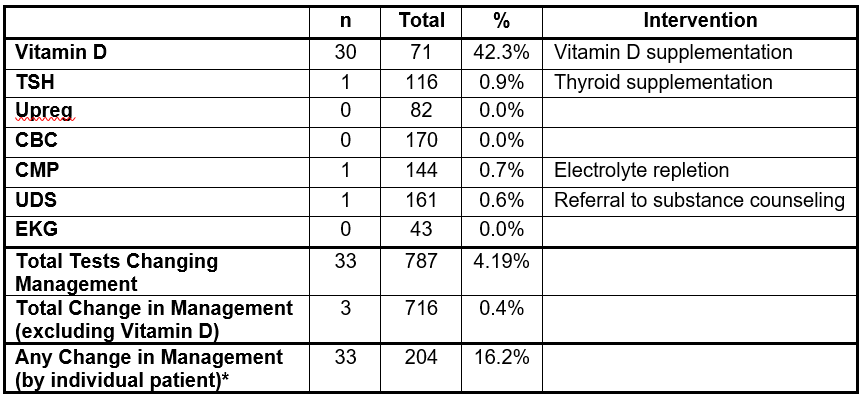Hospital Medicine
Session: Hospital Medicine 1
305 - Evaluating the Impact of Screening Diagnostic Tests for Behavioral and Psychiatric Admissions on Patient Management in a Pediatric Tertiary Care Center
Friday, May 3, 2024
5:15 PM - 7:15 PM ET
Poster Number: 305
Publication Number: 305.173
Publication Number: 305.173

Kendall A. Franz, MD (she/her/hers)
Resident Physician, Internal Medicine-Pediatrics
UH Rainbow Babies & Children's Hospital
Cleveland, Ohio, United States
Presenting Author(s)
Background: Screening tests are commonly sent at time of admission for inpatient psychiatric treatment, despite recommendations for individualized decision-making based on clinical assessment. Few studies have examined whether or not this testing identifies organic causes for psychiatric conditions or influences management in the pediatric population. Routine laboratory testing may add additional costs to hospitalization, delay access to psychiatric care, and lead to unnecessary evaluation.
Objective: To measure the frequency of routine screening diagnostic testing for patients presenting with psychiatric and/or behavioral complaints and to determine whether this testing influences patient management.
Design/Methods: Retrospective chart review of emergency department encounters was performed for patients ages 5 to 18 years seen at a tertiary care center for psychiatric and behavioral concerns from March 1, 2019 to November 29, 2021. Patients with complex medical needs and patients who underwent treatment for an unrelated medical condition were excluded. For each patient, it was determined whether tests were sent for treatment versus screening purposes and whether screening tests resulted in a change in management. Patients who were transferred to outside facilities were excluded from this second stage of analysis.
Results: Of the 341 patients who met inclusion criteria, 240 underwent screening diagnostic testing not for a medical indication. Median age was 15.3 years (IQR 13.1-17.0), 48.1% were admitted. Of the patients admitted, 86.5% were for psychiatric concerns and 13.5% were for behavioral concerns. The most common laboratory test was complete blood count (58.9%), and 55.1% of post-pubescent females underwent urine pregnancy testing. Of the diagnostic screening tests sent, a change in management occurred in 16.2% of patients. Vitamin D deficiency was the most commonly identified and treated abnormality. No pregnancies were identified. When excluding vitamin D, three out of 716 diagnostic tests sent for screening purposes resulted in a change in management (0.4%).
Conclusion(s): Diagnostic testing for patients admitted with psychiatric or behavioral concerns is low-yield and rarely contributes to a change in management. The decision to obtain diagnostic testing should be individualized based on clinical assessment. Standardized institutional protocols that include routine screening for organic causes of behavioral health disorders and medical clearance should be reconsidered.


